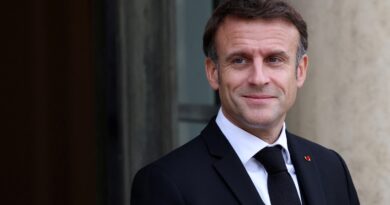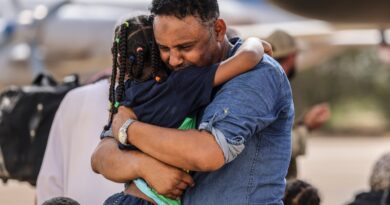Putin, eyeing reelection, holds annual news conference and call-in show
Putin, who is completing his 24th year as Russia’s supreme political leader, has used the heavily staged events to lay out his vision for domestic and foreign policy and to preside with kingly aloofness as journalists vie for his attention and citizens supplicate him for assistance.
Normally, the events take place annually and on separate dates. But in the tumultuous first year of the Ukraine invasion, after repeated battlefield setbacks and a messy military mobilization, Putin did not subject himself to such public exposure.
Last month, however, the Kremlin announced that it would hold the two events simultaneously “in a combined format.” One motive, given the election scheduled for March, appeared to be to showcase Putin’s fifth campaign for president, which he is expected to win easily because the Kremlin controls all major media outlets, has jailed opponents and has severely punished any anti-regime dissent.
The combined media extravaganza is being held in Gostiny Dvor, a historic market space now used as an exhibition and conference hall, close to Red Square — where the military and security services maintain formidable air defenses. Over the past year, the Russian capital has been hit numerous times by drone strikes — including an attack in May on the Kremlin that Russia said targeted Putin but was thwarted. Ukrainian officials denied the assassination attempt.
Even for professed supporters of Putin, the news conference and call-in show highlight his authoritarian, strongman rule and, by contrast, the ineptitude of national, regional and local government institutions.
“For most, this is the only hope and opportunity to solve their most important problems,” Russian state TV anchor Nikolai Zusik said during a recent newscast, inadvertently underscoring Putin’s increasing isolation and the uselessness of Russia’s pervasive bureaucracy.
Russian authorities have cracked down widely on dissent, especially criticism of the war — driving most independent news outlets from the country and jailing political opposition figures who refused to flee.
Having cleared away the liberal-progressive elements of society that opposed Putin’s push for a more conservative and authoritarian Russia, the Kremlin now faces pressure from the wives and mothers of soldiers conscripted to fight in Ukraine during the unpopular mobilization. Many have not returned home since then and effectively have served in trenches for 15 months.
On Thursday, Putin is almost certain to face questions about the treatment of conscripted soldiers and about his overall war plan. Some of Putin’s proxies have already started answering them.
“They will return home after the completion of a special military operation,” Andrei Kartapolov, chairman of the defense committee in the State Duma, Russia’s lower house of parliament, said recently, using the Kremlin’s euphemism for the war. “No rotation is envisioned for them,” he said. “They are entitled to leave for every six months of service, and they now go on these vacations.”
Activists from The Way Home, a group that unites wives and mothers of mobilized Russia fighters, said they have sent hundreds of pleas demanding that mobilized men be returned home — in a bid to take up the Kremlin’s promise that all requests submitted for “Direct Line” will be reviewed and solved.
“Flood them with your messages until the end of the line and blow up their phones,” a post on The Way Home Telegram channel says, urging family members to bombard the Kremlin with demands that Putin formally end the mobilization, which he has never done.
“Will this remain purposely unnoticed? Our patience is running out,” another message said. “Please note that we should not be raising the issues of rotation, vacations, payments, benefits, but the actual demobilization of our men.”
Since it was created in September, the group massed nearly 35,000 members.
Its organizers said that Russian state media outlets have made attempts “to discredit” the group and that law enforcement officers have visited several activists at home to warn them about potential punishments for online posts or for taking part in unsanctioned demonstrations.
According to Russian officials, at least 300,000 men were mobilized in the fall of last year, although that number is widely believed to be an underestimation.
Regardless of whether Putin addresses the growing discontent among families of Russian soldiers, his general message about the prospects of the war in Ukraine — set to enter its third year at the end of February — will probably be the centerpiece of his remarks on Thursday, along with his vision for his next six-year presidential term.
Last week, Putin confirmed that he will run, paving the way for him to remain in power until 2030. The announcement came from a Russian military officer, who told a group of state media reporters that he had pleaded with Putin to run on behalf of soldiers fighting in Ukraine — and that the president had agreed.
The officer, Lieut. Col. Artyom Zhoga, took the reins of the ultranationalist Sparta Battalion in 2022 from his son, who died from injuries sustained in Ukraine.
“In general, it is symbolic that Putin was nominated by people whose children died there,” Tatiana Stanovaya, the founder of R. Politik, a Russian political consultancy, who is now based in Paris, wrote in a Telegram post. “I think this is no coincidence and will be used partly as a response to the protest of the wives and mothers of the mobilized.”
“The Kremlin is showing society that there are two types of behavior: true patriots who are ready to give up what is most precious for the sake of the Motherland,” Stanovaya added, “and [those] … who do not understand what the country is fighting for.”
Ilyushina reported from Riga, Latvia.



